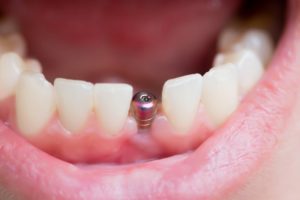Dental implants are known for offering many benefits to those suffering from tooth loss. They can restore your smile, make chewing foods easier, and last for many years without any issues. However, while still being minimally invasive, dental implant placement can lead to complications. It is rare, but dental implant failure does affect a very small population and those considering treatment should be aware of the risks and risk factors associated with dental implants in Colorado Springs.
The Two Types of Failure
Dental implant failure falls into two categories: early failure and late/long-term failure.
When an implant fails in the early stages, it’s typically because the titanium post failed to integrate properly with the alveolar bone. Failure of this variety generally occurs within the first three to four months after placement.
Late failure occurs when the implant has fully integrated with the bone, but bone loss occurs months or years later. It can occur anywhere from 1 to 10 years after the implant has fully integrated with the bone.
Keep in mind that 10-year survival rates for integrated implants are consistently over 95 percent, so implant failure is still very rare in modern dentistry. Having a qualified dentist removes nearly all of the risk associated with implant failure, so confirming this early is crucial prior to your treatment.
The Risk Factors for Failure
Dentists who are trained to place dental implants will always take the necessary protocols into consideration prior to your treatment. With that said, the most common reasons for dental implant failure include the following:
- Poor oral care by the patient (i.e. gum disease and oral infections caused by plaque development)
- The use of tobacco products during the early implantation stages which affect the implants ability to heal and integrate properly
- Chronic health conditions (i.e. autoimmune disorders, diabetes, osteoporosis)
- Certain medications (i.e. bisphosphonates which treat osteoporosis)
- Poor blood supply
Thankfully, the majority of dental implant failures can be avoided with early intervention and the right medical attention. However, if your implants are failing, here’s how a dentist can help get you back on track.
Can the Dental Implant Be Restored?
To save your implant, the dentist can perform a thorough cleaning of the implant and recommend improved oral care habits at home. They can also remove inflamed tissue and perform bone grafting around the implant. In some cases, the crown may need to be removed, allowing the implant to remain buried for healing. If the implant cannot be saved and your neighboring teeth and gum tissue is at serious risk of damage, the implant will be fully removed.
While dental implants carry a very small risk of failure, you shouldn’t rule them out entirely. To learn more about treatment and whether it’s right for you, schedule an appointment with a dentist in Colorado Springs!
About the Author
Dr. James Orban earned his dental degree from the Georgetown University dental school and his specialty training in periodontics from the University of Minnesota. As a periodontist, his expertise includes the treatment of periodontal disease as well as the placement of dental implants. To learn more about his practice, you can contact him through his website.


